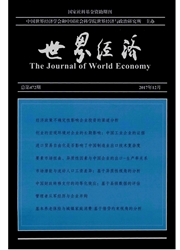

 中文摘要:
中文摘要:
本文采用世界银行2013年的营商环境调查数据,以各国进口一件标准货物在境内所花费的时间、费用和需要办理的单证数来度量通关成本,在产品一国家层面上估计了进口国通关成本对中国出口的影响。研究发现:在控制引力模型中的其他变量后,进口国通关成本越高,中国对其出口越少。在进口国境内所需时间每增加1天、费用每增加100美元和单证数每增加1张,中国对其出口分别减少0.85%、1.01%和5.44%,其作用等价于双边距离分别增加151、194和746公里,或等价于进口国关税税率分别上升22.86%、26.52%和110.43%。通关成本的作用在不同环节、国家和产品层面表现出差异性,且其对出口扩展边际有负面影响,对出口单价有正面影响。
 英文摘要:
英文摘要:
This paper examines the influence of import customs costs on China's export. Using World Bank's 2013 Doing Business database, we measure customs costs by the time, monetary cost and documents needed within an importer's border for a standardized containerized cargo shipped by sea. We estimate a product-destination level gravity model and find that, by controlling other gravity variables, customs costs have a significantly negative effect on China's export. An increase of 1 day, 100 dollars and 1 document within an importer's border decreases export by O. 85%, 1.01% and 5.44%, respectively. The effects are correspondingly equivalent to those of an increase of bilateral distance by 151kin, 194kin and 746km, or an increase of tariff by 22. 86% , 26.52% and 110. 43% . Furthermore, our analysis shows heterogeneous effects of customs costs among different shipping procedures, countries and products. Finally, customs costs affect export extensive margin negatively and export unit value positively. Our findings provide some empirical support for the trade facilitation reform.
 同期刊论文项目
同期刊论文项目
 同项目期刊论文
同项目期刊论文
 期刊信息
期刊信息
